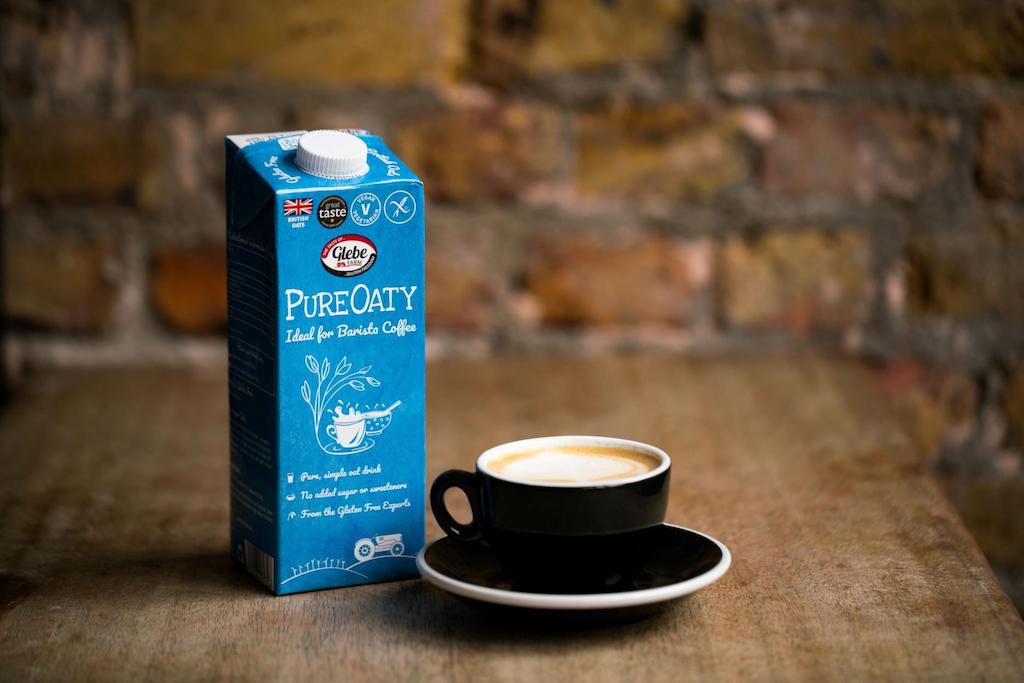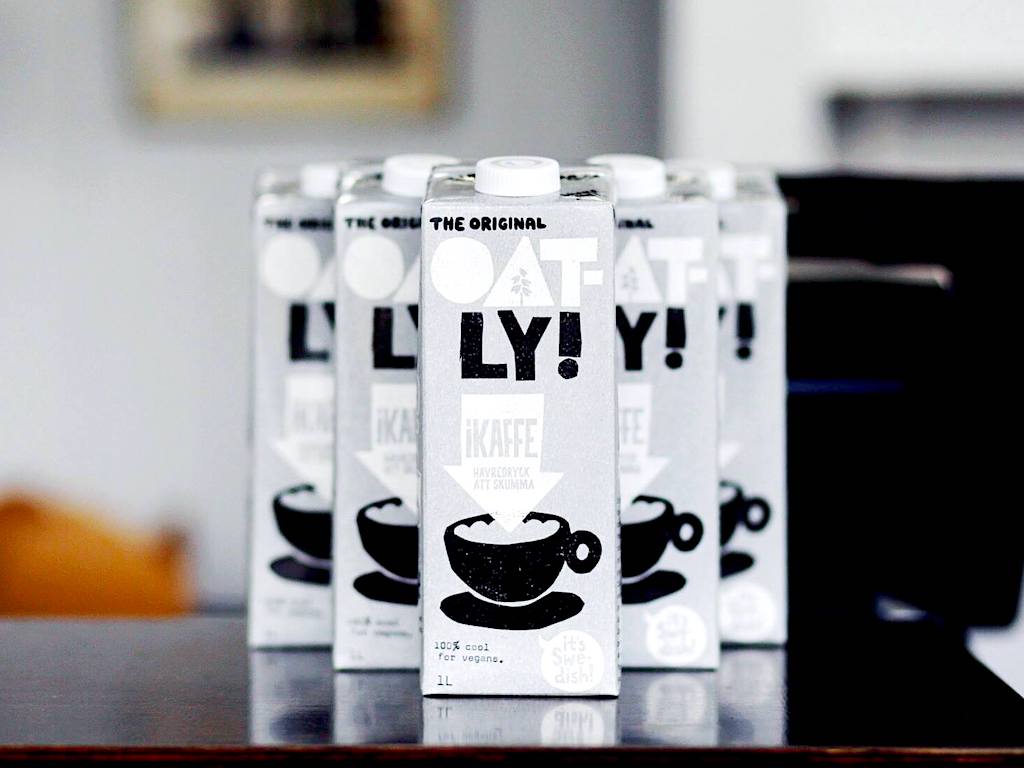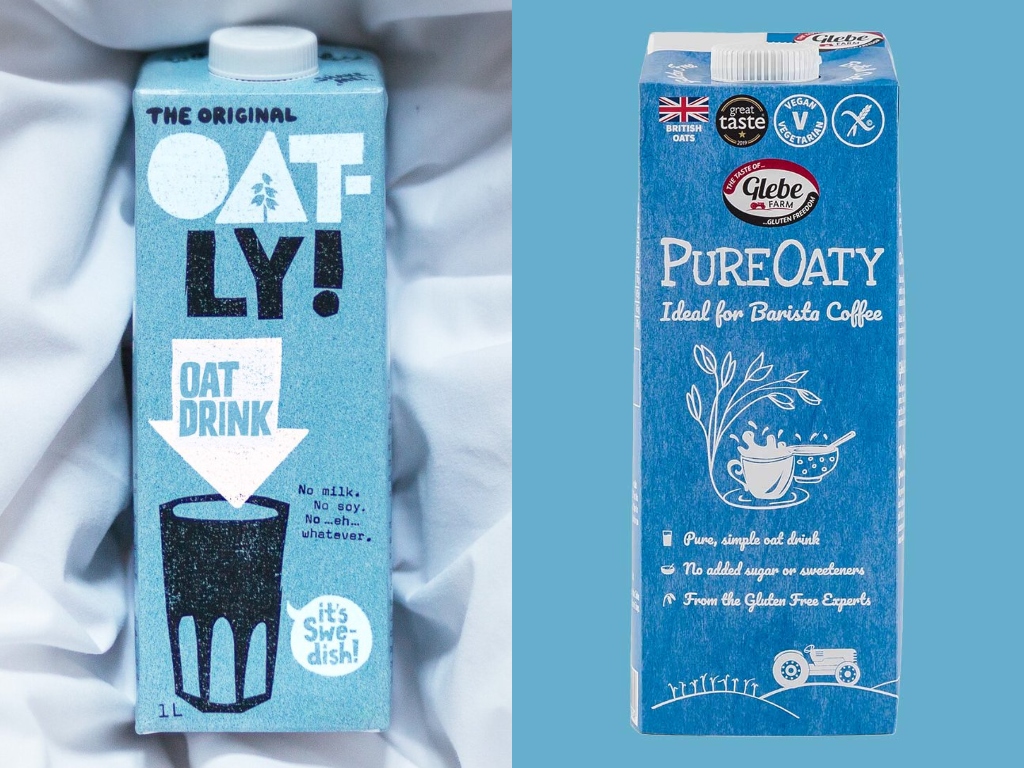Oatly v. Glebe: Is The Now Public Alt Milk Pioneer Being Unreasonable? An IP Lawyer Answers All Your Questions
9 Mins Read
Oatly, the oat milk pioneer that recently went public on the U.S. stock market and now boasts a market cap of over US$14 billion, is being hung to dry because of its trademark infringement lawsuit against small-time oat milk producer Glebe Farms, a U.K. based company that markets a product called PureOaty. Social media is ablaze with posts about Oatly’s legal woes. The whole world is calling Oatly a mean, petty bully. The interwebs narrative seems to be: now that they’ve IPOed, big, bad Oatly is flooded with cash and needlessly pushing this little brand around because they can. So far, so basic.
Not content to let social media be the judge, we wanted to know: does the suit have merit or is Oatly being unreasonable? Not being legal experts ourselves, we called up Chantal Koller, IP lawyer extraordinaire and Managing Director at Novagraaf Switzerland, a leading European consultancy specialised in the protection and management of intellectual property to ask her all our questions. Below, her responses.
Editor’s Note: we also asked Oatly a few questions on the lawsuit- scroll down for their reply.
Hi Chantal, thanks for speaking to Green Queen. Let’s get started: why would Oatly sue a small-time oat milk producer?
Every strong brand is the result of some legal wins; companies have to choose their battles in order to have some assertive court decisions, which will then show the competitors that they have a certain power/notoriety on which they can base themselves on the long term.
From a pure legal perspective, Oatly could have left OATY live as is, the mark is rather confidential and local, does not seem to have any intentions to go global, and does not represent much of a threat for a business like Oatly.
However, legal battles also have to be pushed as long as the trademark registrations are not submitted to use requirements: indeed, after 5 years of age, every trademark registration has to be backed-up by real and effective use on the market where you intend to be offensive against third parties.
And here, the question is not only if the mark is really used, but the main question on the legal side is whether the offensive company is able to prove it; the quality of the evidence and the time/efforts/resources to produce the correct evidence, to raise those questions in a legal battle, are a considerable game changer.
From a business point of view, Oatly is now a big company backed by a lot of investors. This means that the legal team representing Oatly (whether in-house or outsourced) is looking at the facts and the legal aspects in a very “dry” way- meaning they are looking at the situation technically.
So from an investor point of view, I see that some of Oatly’s marks are now slowly reaching these 5 years of age, and it does make sense for a company with investors to assert their rights in chosen legal battles. In that sense, you could say that Oatly did indeed make a wise business decision.

What elements need to be considered when judging IP similarity? Put another way, how similar are the two brands, legally speaking?
The elements that need to be considered are all these conditioning the overall impression. A legal confusion is retained when the overall impression that remains in the consumers mind is leading to an actual confusion when associating each product to the company producing it. The elements conditioning the overall impression can be the words, images and other conceptual references enclosed on each packaging. From a pure trademark law perspective, the conceptual meaning is usually of lower importance than the names and device elements. The unfair competition act, in some jurisdictions, however also take other elements like colors and concepts into account to determine whether there is a legal violation. One important aspect is however that words or other elements which belong to the public domain remain in available for all competitors to use; in other words, they cannot be monopolized by one company.
In this specific case, the names are indeed similar to some extent as they share the letters O-A-T-Y and that the missing “L” in OATLY is a letter that is rather weak in the pronunciation of the name… hence there are some arguments in favor of a confusion. However, the term “oat” is descriptive, and as raised above, no company can have a monopoly over words belonging to the public domain. Therefore, the court will have to determine if this descriptiveness is sufficiently important in the present case to confirm/decline a risk of confusion.
The other elements on the packaging in conflict will also be taken into consideration: the reproduction of a cup of tea and other concepts to which the products refer will be additional elements for the judges to consider. This being said, concepts are not protectable by IP law, therefore the simple “idea” of a cup on a pack of beverage is not sufficient to create consumer confusion as it also refers to the way the product will actually be drunk.
In my view, the other elements (names/devices) used on each packaging are not creating an overall impression that makes both products confusing. In other words, the average consumer would not mistake one product for the other, and would not- still in my opinion- consider that both products could come from the same company, especially seeing Glebe Farm’s name/logo is on their pack.
Why would Glebe Farms not have responded when Oatly first approached them about the issue in 2020?
The reason why they have not entered a coexistence discussion prior to a legal battle is something that belongs to them only, but my impression is the following: they are not in a strength position from a business/financial point of view. In some battles, it is much preferable to be the defending party: you wait until the offensive party shows its game and responding thereto is usually much cheaper, especially if you have quite straightforward arguments (as described under my first point above). And above all, if they would have sat at a negotiation table with Oatly and their lawyers, they may have been crunched and bullied into abandoning the word “OAT”, which from an ethical and business point of view is not right.
Is ignoring such things ever a good plan?
Yes, it can be part of a plan. Good or bad, when you are being attacked you need to choose how you are going to run your battle. In this case, I would consider that Glebe Farms was rather well advised.
Oatly has said in a statement that it has no choice because Oaty is too similar to Oatly and letting this go would open them up to bigger trademark challenges in the future. Is this accurate?
As mentioned above, it’s not entirely a “no choice” situation, but rather a “wise business choice” by maximizing the IP law and practice elements. As always with legal things: it’s not black or white, but rather grey shades… depending on where you sit.
Is Oatly being “as fair as possible” by making the court documents public and by using the international courts so it’s cheaper for Glebe?
That’s is good PR for Oatly, but if documents were really confidential, they would not disclose them.
How strong of a case does Oatly have, in your view?
The odds are 40%-60% in favor of Glebe Farms in my opinion. So not so much a strong case, but it’s probably a test case for them to see how strongly the name “Oatly” resists to the descriptiveness argument after being rather notorious, as notoriety can replace the lack of distinctiveness sometimes.
So, Glebe Farms have a strong chance of winning?
I consider that they have very good chances to win this battle (or at least not to lose it): the real risk of confusion between both products (and not only the names) is, in my opinion, lower than average. It is also an ethical business choice not to let the “Goliath” company crunch the smaller (“David”) player, which can then also be leveraged into positive communication.

Also worth reading: Oatly’s side of the story
We reached out to Oatly to ask them about the suit and get their side of the story. Here’s what Åsa Ragnar, Chief Corporate Communications Officer at the company, told us.
Why did you undertake this lawsuit?
We are limited in what we can say as this is an ongoing court case. But first of all, Oatly is all about sustainability and ensuring a better future for plant-based foods. We would love for Glebe Farm to continue selling oat drink, but this case is not about that, it’s about the likeness in our branding. Oatly will always welcome anyone that accompanies us in the movement towards a more plant based and sustainable diet globally.
Is the essence of the suit about the use of the word OATY? or is it also about the barista term, the shake language and the blue color?
I can’t get into any details around the case as it is still ongoing.
How do you feel seeing Oatly reframed as a bully when for two decades you have fought lawsuits from Big Dairy?
What is important to me personally is that I know we are still the same company as we have always been, still fighting for a plant-based future, still true to our mission! That doesn’t change even if someone calls us a bully.
Social media can quickly become a court of public opinion that is emotionally charged but not always factual. Do you think the situation is being portrayed fairly?
I cant be a judge of people’s emotions. We’re here for the long game and we will never stop working towards a better future for people and the planet. That’s what matters!
Is there anything else you’d like to add?
We have no interest in causing Glebe Farm economic damage. That’s why our honest intention was to find a solution to this case outside of the court room, as we tried to initiate a constructive dialogue between us. When that invite was turned down, we intentionally chose the IPEC*) court because it has limited cost coverage. Neither do we have any interest in causing Glebe Farm any unnecessary product waste, as that would not be a very sustainable act. Depending on the outcome of the decision, we have no interest in any already produced products or packaging to be scrapped. This court case has nothing to do with anything but us protecting our intellectual property, something we’ve always done and is a common practice in all industries. Even if we wanted to, we can’t make exceptions based on the size of the company, or their ownership structure. If we let a smaller player pass, the big players, like a dairy company, will be free to use similar branding and the name OATY, is too close to OATLY to us. That’s just how trademark protection works.
So no matter how it looks from the outside this is not us trying to hinder the plant-based movement or stopping Glebe Farm from producing and selling oat drinks. Quite the opposite. We welcome everyone on-board who wants to be part of the plant-based movement. We just think that everyone should have their own unique brand-name. Our uniqueness is part of our strength when driving the plant-based movement, so our brand is something we always have and always will protect. It’s nothing personal, strange or new.
The court case documents are public, and we’ve made them available on oatly.com here: https://www.oatly.com/uk/oatly-vs-glebe-farm. You can also request additional information by sending an email to IPEC@justice.gov.uk* referring to the case number Claim No. IP-2020-000058.
Lead image courtesy of Oatly / Glebe Farms / designed by Green Queen Media.




